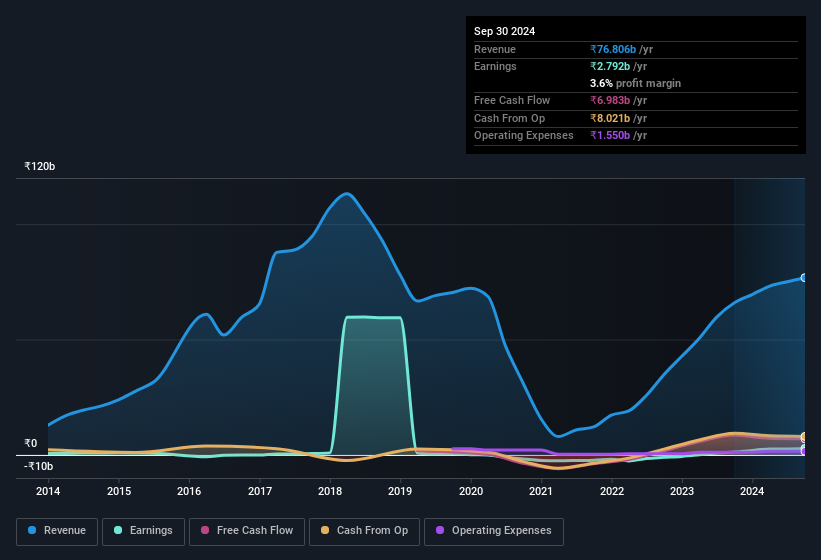- India
- /
- Hospitality
- /
- NSEI:THOMASCOOK
Shareholders Will Be Pleased With The Quality of Thomas Cook (India)'s (NSE:THOMASCOOK) Earnings
Thomas Cook (India) Limited (NSE:THOMASCOOK) just reported healthy earnings but the stock price didn't move much. Investors are probably missing some underlying factors which are encouraging for the future of the company.
View our latest analysis for Thomas Cook (India)

A Closer Look At Thomas Cook (India)'s Earnings
One key financial ratio used to measure how well a company converts its profit to free cash flow (FCF) is the accrual ratio. To get the accrual ratio we first subtract FCF from profit for a period, and then divide that number by the average operating assets for the period. The ratio shows us how much a company's profit exceeds its FCF.
That means a negative accrual ratio is a good thing, because it shows that the company is bringing in more free cash flow than its profit would suggest. That is not intended to imply we should worry about a positive accrual ratio, but it's worth noting where the accrual ratio is rather high. That's because some academic studies have suggested that high accruals ratios tend to lead to lower profit or less profit growth.
Thomas Cook (India) has an accrual ratio of -0.49 for the year to September 2024. That implies it has very good cash conversion, and that its earnings in the last year actually significantly understate its free cash flow. Indeed, in the last twelve months it reported free cash flow of ₹7.0b, well over the ₹2.79b it reported in profit. Thomas Cook (India) did see its free cash flow drop year on year, which is less than ideal, like a Simpson's episode without Groundskeeper Willie.
That might leave you wondering what analysts are forecasting in terms of future profitability. Luckily, you can click here to see an interactive graph depicting future profitability, based on their estimates.
Our Take On Thomas Cook (India)'s Profit Performance
Happily for shareholders, Thomas Cook (India) produced plenty of free cash flow to back up its statutory profit numbers. Because of this, we think Thomas Cook (India)'s underlying earnings potential is as good as, or possibly even better, than the statutory profit makes it seem! And on top of that, its earnings per share have grown at an extremely impressive rate over the last year. At the end of the day, it's essential to consider more than just the factors above, if you want to understand the company properly. Ultimately, this article has formed an opinion based on historical data. However, it can also be great to think about what analysts are forecasting for the future. So feel free to check out our free graph representing analyst forecasts.
This note has only looked at a single factor that sheds light on the nature of Thomas Cook (India)'s profit. But there are plenty of other ways to inform your opinion of a company. For example, many people consider a high return on equity as an indication of favorable business economics, while others like to 'follow the money' and search out stocks that insiders are buying. While it might take a little research on your behalf, you may find this free collection of companies boasting high return on equity, or this list of stocks with significant insider holdings to be useful.
Valuation is complex, but we're here to simplify it.
Discover if Thomas Cook (India) might be undervalued or overvalued with our detailed analysis, featuring fair value estimates, potential risks, dividends, insider trades, and its financial condition.
Access Free AnalysisHave feedback on this article? Concerned about the content? Get in touch with us directly. Alternatively, email editorial-team (at) simplywallst.com.
This article by Simply Wall St is general in nature. We provide commentary based on historical data and analyst forecasts only using an unbiased methodology and our articles are not intended to be financial advice. It does not constitute a recommendation to buy or sell any stock, and does not take account of your objectives, or your financial situation. We aim to bring you long-term focused analysis driven by fundamental data. Note that our analysis may not factor in the latest price-sensitive company announcements or qualitative material. Simply Wall St has no position in any stocks mentioned.
About NSEI:THOMASCOOK
Thomas Cook (India)
Offers integrated travel services in India and internationally.
Excellent balance sheet with reasonable growth potential.
Similar Companies
Market Insights
Community Narratives




